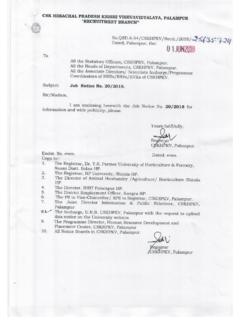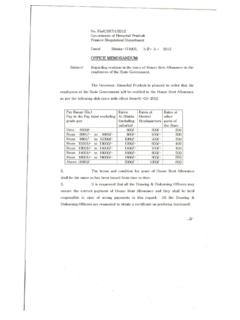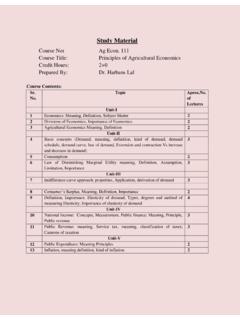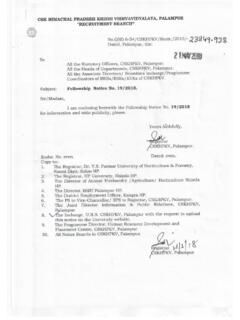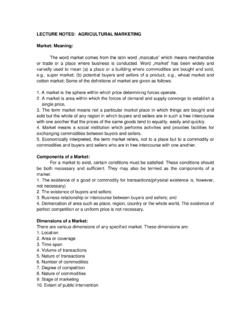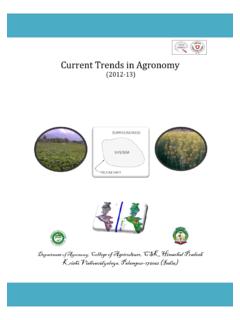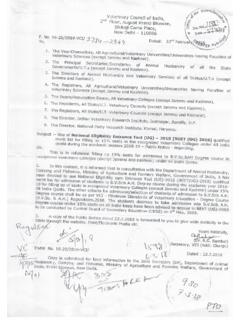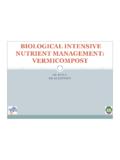Transcription of LECTURE NOTES: AGRICULTURAL MARKETING …
1 LECTURE notes : AGRICULTURAL MARKETING . market : meaning : The word market comes from the latin word marcatus which means merchandise or trade or a place where business is conducted. Word market has been widely and variedly used to mean (a) a place or a building where commodities are bought and sold, , super market ; (b) potential buyers and sellers of a product, , wheat market and cotton market ; Some of the definitions of market are given as follows: 1. A market is the sphere within which price determining forces operate. 2. A market is area within which the forces of demand and supply converge to establish a single price. 3. The term market means not a particular market place in which things are bought and sold but the whole of any region in which buyers and sellers are in such a free intercourse with one another that the prices of the same goods tend to equality, easily and quickly. 4.
2 market means a social institution which performs activities and provides facilities for exchanging commodities between buyers and sellers. 5. Economically interpreted, the term market refers, not to a place but to a commodity or commodities and buyers and sellers who are in free intercourse with one another. Components of a market : For a market to exist, certain conditions must be satisfied. These conditions should be both necessary and sufficient. They may also be termed as the components of a market . 1. The existence of a good or commodity for transactions(physical existence is, however, not necessary). 2. The existence of buyers and sellers;. 3. Business relationship or intercourse between buyers and sellers; and 4. Demarcation of area such as place, region, country or the whole world. The existence of perfect competition or a uniform price is not necessary. Dimensions of a market : There are various dimensions of any specified market .
3 These dimensions are: 1. Location 2. Area or coverage 3. Time span 4. Volume of transactions 5. Nature of transactions 6. Number of commodities 7. Degree of competition 8. Nature of commodities 9. Stage of MARKETING 10. Extent of public intervention 11. Type of population served 12. Accrual of MARKETING margins market structure meaning : The term structure refers to something that has organization and dimension . shape, size and design; and which is evolved for the purpose of performing a function. A. function modifies the structure, and the nature of the existing structure limits the performance of functions. By the term market structure we refer to the size and design of the market . 1. market structure refers to those organizational characteristics of a market which influence the nature of competition and pricing, and affect the conduct of business firms;. 2. market structure refers to those characteristics of the market which affect the traders behaviour and their performances.
4 3. market structure is the formal organization of the functional activity of a MARKETING institution. An understanding and knowledge of the market structure is essential for identifying the imperfections in the performance of a market . Components of market Structure: The components of the market structure, which together determine the conduct and performance of the market , are: 1. Concentration of market power: 2. Degree of product differentiation: 3. Conditions for entry of firms in the market : 4. Flow of market information: 5. Degree of integration: Dynamics of market Structure Conduct and performance: The market structure determines the market conduct and performance. The term market conduct refers to the patterns of behaviour of firms, especially in relation to pricing and their practices in adapting and adjusting to the market in which they function. Specifically, market conduct includes: (a) market sharing and price setting policies.
5 (b) Policies aimed at coercing rivals; and (c) Policies towards setting the quality of products. The term market performance refers to the economic results that flow from the industry as each firm pursues its particular line of conduct. Society has to decide the criteria for satisfactory market performance. Some of the criteria for measuring market performance and of the efficiency of the market structure For a satisfactory market performance, the market structure should keep pace with the following changes: 1. Production pattern: 2. Demand pattern: 3. Costs and patterns of MARKETING functions: 4. Technological change in Industry: AGRICULTURAL MARKETING : Concept and Definition: The term AGRICULTURAL MARKETING is composed of two words-agriculture and MARKETING . Agriculture, in the broadest sense, means activities aimed at the use of natural resources for human welfare, , it includes all the primary activities of production.
6 But, generally, it is used to mean growing and/or raising crops and livestock. MARKETING connotes a series of activities involved in moving the goods from the point of production to the point of consumption. It includes all the activities involved in the creation of time, place, form and possession utility. According to Thomsen, the study of AGRICULTURAL MARKETING , comprises all the operations, and the agencies conducting them, involved in the movement of farm-produced foods, raw materials and their derivatives. Objectives of the Study: A study of the AGRICULTURAL MARKETING system is necessary to an understanding of the complexities involved and the identification of bottlenecks with a view to providing efficient services in the transfer of farm products and inputs from producers to consumers. Scope and Subject Matter of AGRICULTURAL MARKETING : AGRICULTURAL MARKETING in a broader sense is concerned with: The MARKETING of farm products produced by farmers The MARKETING of farm inputs required by farmers in the production of farm products Subject of AGRICULTURAL MARKETING This includes product MARKETING as well as input MARKETING .
7 The subject of output MARKETING is as old as civilization itself. The importance of output MARKETING has become more conspicuous in the recent past with the increased marketable surplus of the crops following the technological breakthrough. The farmers produce their products for the markets. Input MARKETING is a comparatively new subject. Farmers in the past used such farm sector inputs as local seeds and farmyard manure. These inputs were available with them; the purchase of inputs for production of crops from the market by the farmers was almost negligible. The new AGRICULTURAL technology is input-responsive. Thus, the scope of AGRICULTURAL MARKETING must include both product MARKETING and input MARKETING . Specially, the subject of AGRICULTURAL MARKETING includes MARKETING functions, agencies, channels, efficiency and costs, price spread and market integration, producer s surplus, government policy and research, training and statistics on AGRICULTURAL MARKETING .
8 Difference in MARKETING of AGRICULTURAL and Manufactured Goods: The MARKETING of AGRICULTURAL commodities is different from the MARKETING of manufactured commodities because of the special characteristics. The special characteristics which the AGRICULTURAL sector possesses, and which are different from those of the manufactured sector, are: 1. Perish ability of the Product: Most farm products are perishable in nature; but the period of their perishability varies from a few hours to a few months. 2. Seasonality of Production: Farm products are produced in a particular season; they cannot be produced throughout the year. In the harvest season, prices fall. But the supply of manufactured products can be adjusted or made uniform throughout the year. Their prices therefore remain almost the same throughout the year. 3. Bulkiness of Products: The characteristic of bulkiness of most farm products makes their transportation and storage difficult and expensive.
9 This fact also restricts the location of production to somewhere near the place of consumption or processing. The price spread in bulky products is higher because of the higher costs of transportation and storage. 4. Variation in Quality of Products: There is a large variation in the quality of AGRICULTURAL products, which makes their grading and standardization somewhat difficult. There is no such problem in manufactured goods, for they are products of uniform quality. 5. Irregular Supply of AGRICULTURAL Products: The supply of AGRICULTURAL products is uncertain and irregular because of the dependence of AGRICULTURAL production on natural conditions. With the varying supply, the demand remaining almost constant, the prices of AGRICULTURAL products fluctuate substantially. 6. Small Size of Holdings and Scattered Production: Farm products are produced throughout the length and breadth of the country and most of the producers are of small size.
10 This makes the estimation of supply difficult and creates problems in MARKETING . 7. Processing: Most of the farm products have to be processed before their consumption by the ultimate consumers. This processing function increases the price spread of AGRICULTURAL commodities. Importance Of AGRICULTURAL MARKETING AGRICULTURAL MARKETING plays an important role not only in stimulating production and consumption, but in accelerating the pace of economic development. Its dynamic functions are of primary importance in promoting economic development. Optimization of Resource use and Output Management: An efficient AGRICULTURAL MARKETING system leads to the optimization of resource use and output management. An efficient MARKETING system can also contribute to an increase in the marketable surplus by scaling down the losses arising out of inefficient processing, storage and transportation. Increase in Farm Income An efficient MARKETING system ensures higher levels of income for the farmers by reducing the number of middlemen or by restricting the commission on MARKETING services and the malpractices adopted by them in the MARKETING of farm products.
